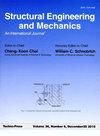Influence of prestressing on the behavior of uncracked concrete beams with a parabolic bonded tendon
IF 3
4区 工程技术
Q2 ENGINEERING, CIVIL
引用次数: 15
Abstract
The influence of prestress force on the fundamental frequency and static deflection shape of uncracked Prestressed Concrete (PC) beams with a parabolic bonded tendon was examined in this paper. Due to the conflicts among existing theories, the analytical solutions for properly considering the dynamic and static behavior of these members is not straightforward. A series of experiments were conducted for a total period of approximately 2.5 months on a PC beam made with high strength concrete, subsequently and closely to the 28 days of age of concrete. Specifically, the simply supported PC member was short term subjected to free transverse vibration and three-point bending tests during its early-age. Subsequently, the experimental data were compared with a model that describes the dynamic behavior of PC girders as a combination of two substructures interconnected, i.e., a compressed Euler–Bernoulli beam and a tensioned parabolic cable. It was established that the fundamental frequency of uncracked PC beams with a parabolic bonded tendon is sensitive to the variation of the initial elastic modulus of concrete in the early-age curing. Furthermore, the small variation in experimental frequency with time makes doubtful its use in inverse problem identifications. Conversely, the relationship between prestress force and static deflection shape is well described by the magnification factor formula of the “compression-softening” theory by assuming the variation of the chord elastic modulus of concrete with time.预应力对带抛物线粘结筋的未开裂混凝土梁性能的影响
本文研究了预应力对无裂纹带抛物线粘结预应力混凝土梁基频和静挠度形状的影响。由于现有理论之间的冲突,正确考虑这些构件的动静态行为的解析解并不简单。在混凝土龄期接近28天的情况下,对一根由高强度混凝土制成的PC梁进行了为期约2.5个月的一系列试验。具体而言,简支型PC构件在早期进行了短期自由横向振动和三点弯曲试验。随后,将实验数据与一个模型进行了比较,该模型将PC梁的动力行为描述为两个相互连接的子结构的组合,即压缩欧拉-伯努利梁和张拉抛物线索。结果表明,未开裂预应力混凝土梁的基频对早期养护过程中混凝土初始弹性模量的变化较为敏感。此外,实验频率随时间的变化较小,使其在反问题识别中的应用受到怀疑。相反,假定混凝土弦弹性模量随时间的变化,“压缩-软化”理论的放大系数公式可以很好地描述预应力与静挠度形状之间的关系。
本文章由计算机程序翻译,如有差异,请以英文原文为准。
求助全文
约1分钟内获得全文
求助全文
来源期刊

Structural Engineering and Mechanics
工程技术-工程:机械
CiteScore
3.80
自引率
18.20%
发文量
0
审稿时长
11 months
期刊介绍:
The STRUCTURAL ENGINEERING AND MECHANICS, An International Journal, aims at: providing a major publication channel for structural engineering, wider distribution at more affordable subscription rates; faster reviewing and publication for manuscripts submitted; and a broad scope for wider participation.
The main subject of the Journal is structural engineering concerned with aspects of mechanics. Areas covered by the Journal include:
- Structural Mechanics
- Design of Civil, Building and Mechanical Structures
- Structural Optimization and Controls
- Structural Safety and Reliability
- New Structural Materials and Applications
- Effects of Wind, Earthquake and Wave Loadings on Structures
- Fluid-Structure and Soil-Structure Interactions
- AI Application and Expert Systems in Structural Engineering. Submission of papers from practicing engineers is particularly encouraged.
 求助内容:
求助内容: 应助结果提醒方式:
应助结果提醒方式:


